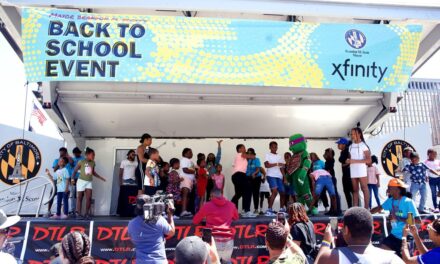By Peter C. Brooks
Although many local policymakers and federal officials would lead you to believe that present-day United States is a color-blind society that is committed to equality in education, employment, and opportunity, when it comes to Native Americans, the statistics overwhelming indicate otherwise.
Despite an optimistic jobs report published by the United Bureau of Labor Statistics in January 2022, the picture for Native Americans is bleak. Just prior to the onset of the COVID-19 pandemic, Native Americans held a higher unemployment rate than all other racial groups, hitting a peak of 7.5 percent in February 2020. As our country wedged itself further and further down into a seemingly inescapable and bottomless pandemic pit, the Native American unemployment rate jumped to an astonishing 28.6 percent – a level not seen since the ghastly days of the Great Depression.
A deeper dive into Native Americans statistics further indicate that both education and health care programs are significantly underfunded relative to the national scale, median household incomes fall 23 percent below national averages, poverty rates are 84% higher, and substance abuse rates among tribal nations are a whopping 40 percent higher than the national population.
The fact is that Native Americans, historically and politically ignored for centuries, continue to struggle to achieve societal inclusion within the very institutions that drive our economy, power our government, and fuel our nation’s future. These statistics reveal what our tribes have known for years: there is a systematic and ongoing standard of Native American bias constructed within the infrastructure of our governmental agencies and no one is directing institutional change, and no one is being held accountable for the lack of influential transformation.
This institutional ignorance borders on criminal neglect and it is time for a change.
On November 8, Maryland Democratic gubernatorial candidate Wes Moore defeated Republican candidate Dan Cox to succeed incumbent two-term Republican Larry Hogan in the state of Maryland’s Governor’s mansion. In winning this election, Moore is set to become the first Black governor of our state and only the third Black person elected as governor to any state.
On the homepage of Governor-Elect Moore’s website, under a heading titled “On the Issues,” Mr. Moore declares “…that no matter where you start in life, you deserve an equal opportunity to succeed – a job you can raise a family on and the chance to create wealth for you and your family.” And, on this point, he is absolutely right. Governor-Elect Moore has similarly indicated an intent to build a “historically inclusive” administration.
If Mr. Moore is to be true to his promise to the people of Maryland, he might consider being inclusive to the original landowners, who had their rights to this sacred ground stolen out from under them by a gang of thieves armed with fountain pens and political leverage in 1632.
It was in June of that year that King Charles granted the Province of Maryland to Lord Leonard Calvert, conveniently ignoring the obvious fact that the land had already been occupied for the better part 10,000 years by the Piscataway Indian Nation and that Great Britain and its Christian monarchy had no lawful claim to the any piece of land in the region.
Today, if a dictator were to do the exact same thing, like, for instance, staking a claim to Crimea or the Donbas region in Eastern Ukraine, the world stands ups and takes notice. In 1632 there was no such reaction and no such sympathy, there was only bloodshed and thievery and manipulation and exploitation and dehumanization and forced assimilation.
The past, of course, is not the responsibility of Governor-Elect Moore, but the future is. It is solely his responsibility to concede the culture of superiority that has hung over our state for centuries and address the lack of inclusivity that exists under his watch today.
The Piscataway people and all of Maryland’s first nation have been ignored for too long. They are taxed without representation; they are discounted without reason. In a land that was stolen and never ceded, they have no cemetery, retirement home, school, state museum, or state protected ceremonial ground to practice the religion. On death and birth certificates, the state would not even allow the single dignity of being identified as Native American.
Yet, the Piscataway Indian Nation is still very much present here in Maryland. There is a Tayac (Chief) who is always about town, and we as Marylanders should value our culture and our history. But despite the best efforts of the many great people, throughout the years, the voice, the dignity, the respect and awareness are missing. There needs to be more representation and effort in government, to engage and encourage citizens to find a role in this incredible unfolding story.
We, as Marylanders, have waged a form of genocide against the first people of Maryland that continues today through cultural and social exclusion. It is both humiliating and shameful. If Governor Elect Moore is to be true to his agenda of inclusion and genuine in his declaration of fairness, he must recognize and include the Piscataway Tayac in his legislative and social initiatives. While still a quasi-sovereign government we all have to admit that they were here first and got a raw deal because of it.
Peter C. Brooks has worked as a correspondence coordinator for the Baltimore Chapter of the National Association for the Advancement of Colored People and as a grant administrator for the Maryland General Hospital. Brooks has held a successful 10-year tenure as mass media assistant professor at Coppin State University.
The opinions on this page are those of the writers and not necessarily those of the AFRO. Send letters to The Afro-American • 233 E. Redwood Street Suite 600G
Baltimore, MD 21202 or fax to 1-877-570-9297 or e-mail to editor@afro.com
Help us Continue to tell OUR Story and join the AFRO family as a member –subscribers are now members! Join here!
The post Genocide against the Native American community continues appeared first on AFRO American Newspapers .











